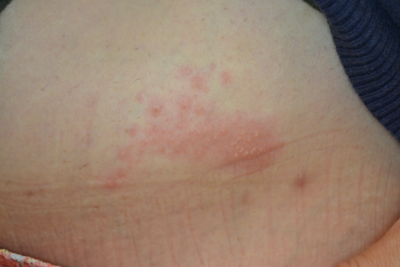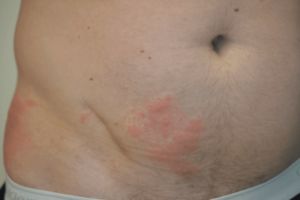Shingles
What is Shingles?
Shingles, also known as herpes zoster, is a viral infection that is caused by the reactivation of varicella zoster, also known as chickenpox. Shingles is very common, affecting almost 1 in 3 Americans in their lifetime.

Anyone who recovers from chickenpox can develop shingles because the varicella zoster virus stays dormant in nerves of the body. The risk of developing shingles increases with age and individuals who have medical conditions that affect their immune systems, or take immunosuppressive drugs are also at an increased risk for developing shingles. Most people have only 1 episode of shingles in their lifetime, but it is possible to have multiple episodes. Shingles can be spread when the rash is in a blister-phase, through direct contact. Once the blisters scab over the infected person is no longer contagious. Shingles can cause chickenpox in people who have never had it, or the vaccine against it. If you have shingles, avoid contact with infants, pregnant women, and immunocompromised individuals.

What are the Symptoms of Shingles?
Shingles is characterized by a painful, blistering rash that develops on one side of the body. About 1-5 days before the rash develops people may experience pain, itching, or tingling in the area where the rash will develop. The rash usually occurs in a linear or band-like distribution on one side of the body starting with redness and swelling and then developing fluid-filled blisters. When it occurs on the face it is also on one side either in the forehead area, cheek or lower face. People often confuse early zoster with poison ivy. The blisters will form scabs in 7-10 days. It takes about 2-4 weeks for the rash to resolve but may take longer and can even leave permanent scars. In people with weakened immune systems, the rash may be widespread across the body, similar to chicken pox.
Other symptoms of shingles include fever, fatigue, chills, nausea, and headache. The most common complication of shingles is postherpetic neuralgia (PHN). This describes when pain is experienced in areas where the rash was, even after it has cleared. PHN usually resolved in a few weeks or months, but it can last for years and be debilitating. Shingles can also lead to problems with vision, hearing, and pneumonia.
How Can I Treat and Prevent Shingles?
If you have herpes zoster you should keep the rash covered, avoid scratching the rash, and wash your hands often. Shingles can be treated with the antiviral medicine valacyclovir. This medication is most effective when taken as soon as possible after the onset of symptoms. It is very important to call your dermatologist or primary care doctor immediately, or seek treatment at an urgent care center, if you suspect you have shingles. Early treatment can avoid the potential painful and debilitating complications of this common infection.
A new vaccine is now available that can significantly reduce the risk of developing shingles. The CDC recommends healthy adults, age 50 or older, get 2 doses of the shingles vaccine called Shingrix, which has been tested to be 90% effective. This can protect against shingles and its consequences.

